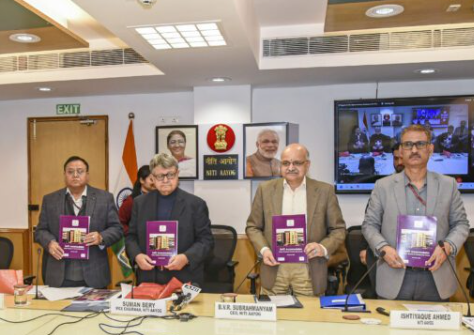NITI Aayog Releases Report on ‘S.A.F.E Accommodation’
The recent report by NITI Aayog emphasizes the necessity of Secure, Affordable, Flexible, and Efficient (S.A.F.E) housing for workers in India’s manufacturing sector. It identifies challenges in worker accommodation and proposes actionable solutions to boost housing, ultimately encouraging industrial growth.
Importance of Worker Housing
Quality housing is essential for India’s manufacturing sector, and directly impacts worker productivity, retention, and job satisfaction. Well-designed accommodations reduce commute times and encourage long-term employment, leading to a stable workforce.
Government Initiatives
The Union Budget 2024-25 brought into light the need for dormitory-style rental housing for industrial workers. This initiative will receive support from both government and private sectors, reflecting a commitment to improving housing conditions essential for manufacturing growth.
India aims to elevate its manufacturing sector’s contribution to GDP from 17% to 25% by 2047. To achieve this, the country must create approximately 7.85 million jobs annually until 2030, predominantly in manufacturing. However, inadequate housing near industrial hubs remains a critical barrier.
Challenges in Worker Accommodation
Zoning laws often restrict residential developments in industrial areas, resulting in longer commutes for workers. High operating costs and stringent building regulations further hinder the provision of adequate housing. Additionally, the financial viability of large-scale projects poses challenges.
The report advocates for classifying worker accommodations as a unique type of residential housing to reduce taxes and utility costs. It suggests amending zoning laws to facilitate mixed-use developments near industrial hubs and simplifying environmental clearances for housing projects.
Financial Support Mechanisms
To overcome financial barriers, the report recommends funding support through the Viability Gap Funding (VGF) programme, covering 30%-40% of project costs. It also proposes transparent bidding processes to enhance efficiency and upgrade existing worker accommodations.
Providing S.A.F.E. accommodations is crucial for India’s manufacturing strategy, which aims to enhance worker retention, increase productivity, and improve global competitiveness. Collaborative efforts among government, industries, and private developers are essential to realise this vision.
GKToday Notes:
- S.A.F.E. Accommodation: This framework represents Secure, Affordable, Flexible, and Efficient housing. It aims to improve worker housing in India’s manufacturing sector, boosting productivity and retention.
- Viability Gap Funding (VGF): VGF is a financial support mechanism. It covers 30%-40% of project costs. This initiative aims to enhance the viability of housing projects for workers.
- NITI Aayog: NITI Aayog is India’s policy think tank. It formulates strategic plans for economic growth. The organisation focuses on sustainable development and cooperative federalism in India.
- Union Budget 2024-25: This budget marks the need for dormitory-style housing. It reflects government commitment to worker welfare. It aims to support industrial growth through improved living conditions.
Month: Current Affairs - December, 2024
Category: Government Schemes Current Affairs







